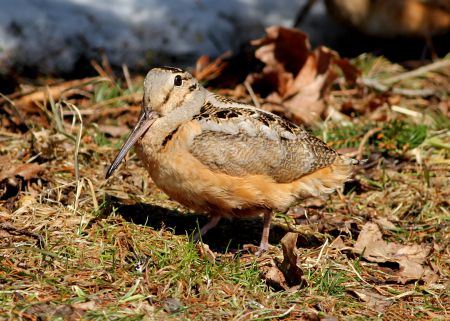KJIPUKTUK (HALIFAX) - Few things frighten me more than starvation in the wild, when animals who have thrived in this region for hundreds of thousands of year succumb to empty stomachs. Something is profoundly wrong when our local environment can’t provide for its animal citizenship. Unfortunately, this is exactly what’s been happening in recent weeks.
Early migratory birds returning to the Maritimes from their winters abroad have been starving to death in alarming numbers. The two species most impacted are the American Robin and the American Woodcock, who typically satisfy their appetites with earthworms pulled from the dirt, but can’t reach the soil because of unseasonal snow cover persisting from our record breaking winter.
In this case, the early bird does not get the worm.
Increased snowfall, paradoxically, is a consequence of climate change. Rising overall global temperatures are causing more water to evaporate and hang suspended in the air as water vapour, which becomes heavy snowfall once temperatures are low enough in winter. Simple as that.
You might have unwittingly bore witness to this mass starvation of birds in recent weeks. The signs of avian starvation are subtle, but they do exist. Birds might not be so eager to fly away from you because of extreme weakness. In other cases you might encounter nocturnal species, like the American Woodcock, feeding in broad daylight out of sheer desperation.
Birds absolutely emaciated by hunger are being delivered by the dozens to the Hope for Wildlife Society in Seaforth and other rehabilitation centres like it. Some birds can be coached back to health while others are beyond help. The Hope for Wildlife Society has also been receiving hundreds of phone calls concerning birds dead or dying. In a conversation with David Currie, president of the Nova Scotia Bird Society, he was quick to remind me that for every dead bird found, there are many more dying out of sight.
This is an ecological tragedy, one which will leave its mark on our migratory bird populations for years to come, but I’m heartened by the actions of regular citizens to save these birds. There’s a growing call from multiple groups to set up feeding stations for these birds on front lawns everywhere. Folks across the Maritimes are encouraged to spread bird seed, diced fruits and worms outside on pie plates where birds might reach them, or you can uncover sections of ground to allow for faster melting and to expose the soil. Heck, you can even throw dog hair, lint and similar materials outside so birds have something to build their nests with. And for goodness sake, keep your pets inside or on a leash. If the American Woodcock can’t fly away from you, what chance does it have against your cat?
Happily, temperatures have been rising and snow cover has been lessening, but these birds have already suffered untold losses, so if you are still eager to play your part, I encourage you to purchase a bird feeder and welcome our migratory birds home with the feast they deserve. Some of these birds don’t eat seeds, like the robin, who prefers fruits like apples and berries. The poor woodcocks, the most impacted, only eat worms and other insects, so keep them in mind while setting the table. Finally, there are still those birds clinging to life at the Hope for Wildlife Society. I’m sure the good people working to save them could use whatever help you can offer.
These birds herald spring with their songs. Let’s make it a warm reception.



